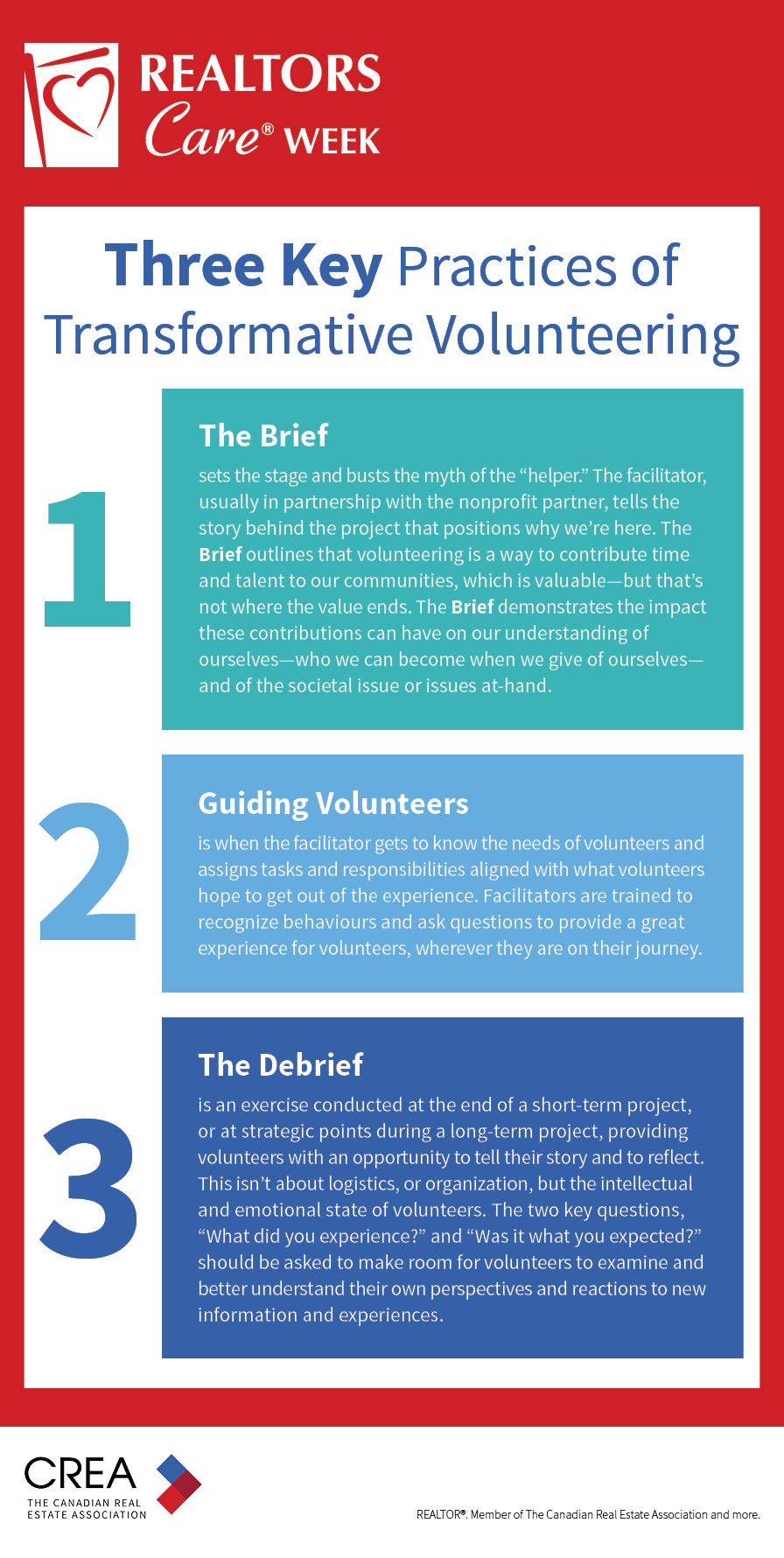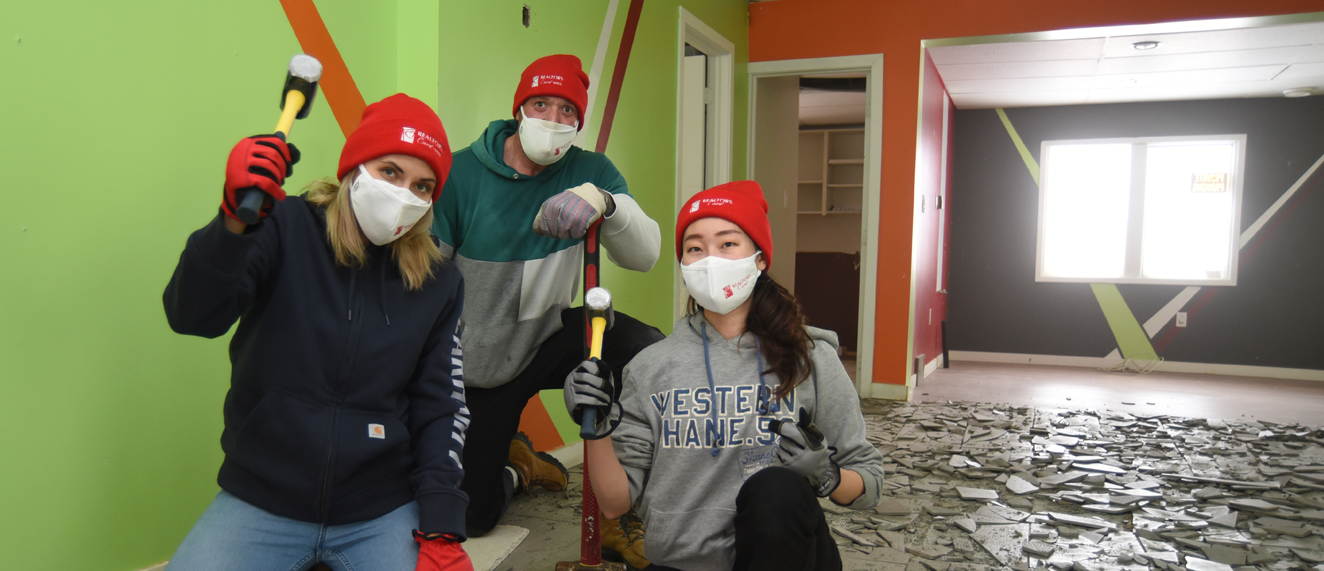The fourth annual REALTORS Care® Week will take place from November 14-20, 2022. Once again, CREA is rallying real estate boards and associations across Canada to organize volunteering activities for their REALTOR® members in support of housing and shelter-related charities in their communities. The following are tips from the transformative volunteering experts at Realized Worth. While they’re intended to be a helpful resource to boards and associations during the lead-up to REALTORS Care® Week, they should prove useful to anyone planning a volunteering event anytime throughout the year.
You’ve probably experienced a “transactional” volunteer engagement: you show up (perhaps with a few friends or colleagues), get a few tasks accomplished for a nonprofit organization, then call it a day and go grab some dinner. You probably feel good about contributing but that halo effect fades after a few days, and you don’t think about it again. There’s nothing wrong with this type of volunteer engagement—particularly if your nonprofit partner says it’s what’s needed.
But there’s another way to approach volunteerism. “Transformative” volunteering is a human-centric approach to volunteering that has the potential to cultivate empathy and shift the way participants think (about themselves and others). Importantly, it shifts us from viewing ourselves as a “helper” or “fixer” doing something “for” communities to a posture of “belonging” and doing “with” communities. It encourages us to check our biases. It also helps us to process our experience in a supportive way.

While there are a few steps required to create a transformative volunteering experience, one of the key things you can focus on when you’re leading a volunteer event is meeting people where they are at in their volunteer journey to get their highest level of contribution. If one of your participants is new to volunteering, you need to treat them a bit differently than you would if they were a seasoned volunteer.
The journey of the volunteer
Volunteer teams typically have different needs and varying levels of experience with volunteering. Knowing and recognizing where people are in their volunteer journey—stage 1, 2 or 3—is key to meeting participants at their highest level of contribution. Meeting participants where they are creates an environment where they have their needs met, have an engaging experience, and where they can choose to keep developing as a volunteer.
One stage isn’t “better” than the next—each stage is simply different. And of course, people never fit neatly into little boxes! But understanding these levels can be helpful as a general construct as you’re assessing your volunteer team and working to facilitate a meaningful experience for everyone involved.
Stage 1 (Tourist): The first stage is one of casual curiosity. Like a tourist visiting a new place for the first time, a first stage volunteer is just beginning to explore. They should be given straightforward, immediately rewarding tasks (such as cooking or serving food in a shelter or doing a craft with a child at a youth centre) that allow them to look, see and discover. If they’re ready, they’ll return to the experience of volunteering and continue through the stages.
Stage 2 (Traveler): The second stage is one of meaningful discovery. Like a traveler who has begun to feel a sense of belonging to the place they visit, second stage volunteers internalize their motivation for volunteering. As they own the experience for themselves, they’re ready to take on leadership responsibility and tasks that require increased commitment.
Stage 3 (Guide): The third stage in the journey of the volunteer is one of intentional alignment. Like a guide who introduces others to the charms of their favourite country, third stage volunteers are motivated by personal, intrinsic reasons. Guides are usually long-time, experienced volunteers who understand volunteering helps them grow and learn as much as it provides opportunities to support their communities.
Engaging each level of volunteer takes a bit of discernment and observation. Once you have a general sense of where each volunteer falls on this continuum, here are a few ideas for meeting your volunteer participants at each level:
Engaging tourists
- assign specific tasks;
- communicate who to ask for help;
- check in regularly;
- keep tasks simple and straightforward; and
- gently invite them to return if they’re willing!
Engaging travelers
- assign higher levels of responsibility and delegate tasks;
- give permission to lead;
- encourage to recruit others;
- ask to oversee other volunteers;
- provide avenues for learning new skills; and
- ask to support again, join other opportunities or projects, and to bring others.
Engaging guides
- ask to collaborate on event design;
- empower to connect with nonprofits and help lead events;
- delegate to guide volunteers or support the brief and debrief; and
- deputize to manage relationships and groups.
No matter what type of volunteer activity you organize for REALTORS Care® Week, when you meet your volunteers where they are at in their volunteer journey to get their highest level of contribution, you’ll be well positioned to carry your community engagement momentum forward with an army of super-volunteers in lock step behind you!
Are you participating in REALTORS Care® Week? Don’t forget to share photos on social media using #REALTORSCareWeek.





